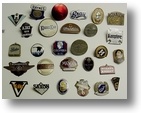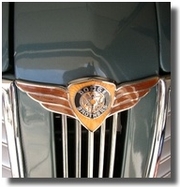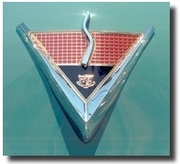|
Emblem care and maintenance
News
Emblemagic is for sale!
Sale Pending!!

It is a privately owned, sole proprietorship that has been in
the business of reproducing, restoring and stocking classic and
collectible car emblems for the past 25 yrs. The
business includes the websites, all stock: original plastic
pattern emblems, and the reproductions in stock, made from them,
Original unrestored enameled emblems as well as all restored
ones, tooling, all molds, and
equipment, plus office software and records. There are written illustrated guides for
reproduction and restoration training purposes. If you are
interested, use the
contact us link.
Don't forget to visit our blog!

Click here to check out the blog!
Cleaning and Polishing
These tips apply to the Plastic Insert emblem and the
Enameled emblem, whether or not they are purchased from us.
The plastic or enameled emblem can be washed safely with the
same mild detergents that are recommended for the car's finish. Both
of these types of emblems have smooth top surfaces that can be easily
cleaned. Dirt and wax buildup can collect in the bezel or edges which
have grooves or other designs. A soft toothbrush, or Q-tip can be used
to finish cleaning around the emblem.
Plastic insert emblems that are dull or mildly scratched can be polished to
a high luster with a fine metal or plastic polish. The best polishes
come in tubes, and should be suitable for nickel, chrome, gold and even
plastic!
Enameled emblems are glass and plated metal, so use caution with any
polishes. If the plating is becoming thin, polish may remove what
little is left.
Both types of emblems can and should be waxed using a non-cleaning,
non-polishing type of automotive wax. For the plastic emblem, this
will seal in the natural plastic oils that when lost cause cracking and
crazing. For the enameled emblem, the wax will protect the plated
finish, including gold finishes. oils that when lost cause cracking and
crazing. For the enameled emblem, the wax will protect the plated
finish, including gold finishes.
Installation tips
Both types of emblems should be installed in the same way
they were originally.
The enameled emblem may sometimes be glued on instead of using the original
solder method, rivets, or press fits. When gluing this type of
emblem we recommend 100% RTV silicone rubber that comes in tubes. It is sold
in auto parts stores and hardware stores. We recommend the Permatex brand.
This will give the emblem a bit of cushioning from vehicle shocks, seals the
backside from moisture, and holds very well. This same glue is
good for the plastic insert as well. It will seal the backside, which
has the painted coatings, from drying out and eventually flaking off. It is
safe to use on the plastic emblem and the metal of the car. Once
cured it is very rubbery and difficult to remove, so wipe off any excess
before it has cured. On the plastic insert emblem, this glue will hold
so well, that it may be necessary to break the emblem to remove it again.
Removal tips
When a plastic insert emblem is glued into its bezel, removing it can be
difficult. We don't recommend prying it out with sharp objects.
One customer sent us this tip: Thanks to Mr. Furry, of Forsyth, IL.
"O.K., I finally got that emblem off its housing. What finally worked best
was boiling it in a Styrofoam cup in the microwave for three successive
boil-cool cycles, cooling only back to room temp. This is sent to you for
future advice to customers, as the freeze technique did not seem to work
well on my emblem. The emblem shows no more crazing than it did prior to the
boil treatment, leading me to conclude(perhaps falsely, as this is only a
one-time experience) that it is reasonably safe. I will call soon regarding
a run of these, the shipping, time lines etc. Thank you for providing this
valued service."
The "freeze" technique mentioned above, also suggested by a customer,
involves letting the plastic insert emblem assembly stay in the freezer
overnight. Using a good adhesive tape, attached across the smooth top
surface, the emblem might be "popped" out, assuming the glue has been made
brittle enough to break and let go. This technique may not work with
the RTV or rubbery glue, but should work with the black emblem glue that was
often found on emblems in the 60's.
Do you have any more suggestions?
Let us know, and we will post them here along with an acknowledgement!
| 



 oils that when lost cause cracking and
crazing. For the enameled emblem, the wax will protect the plated
finish, including gold finishes.
oils that when lost cause cracking and
crazing. For the enameled emblem, the wax will protect the plated
finish, including gold finishes. 
